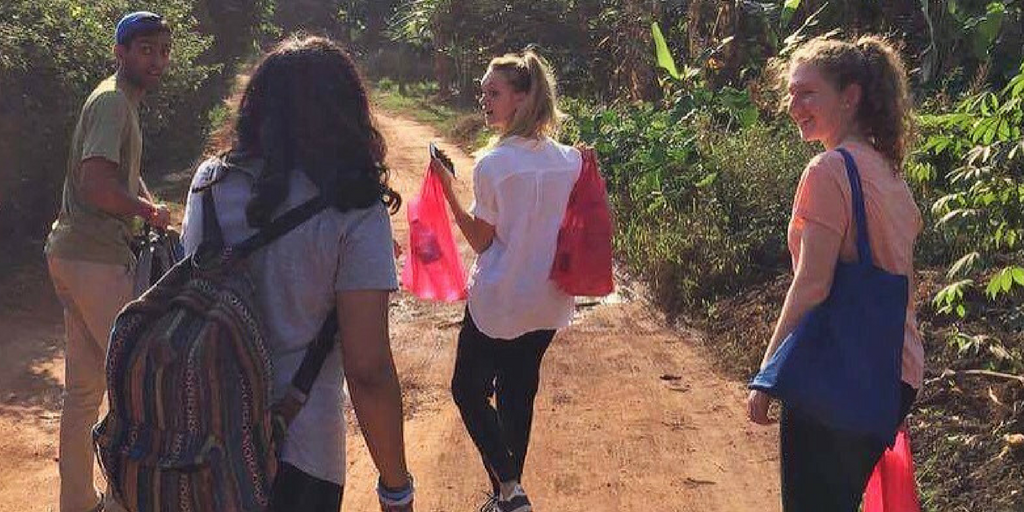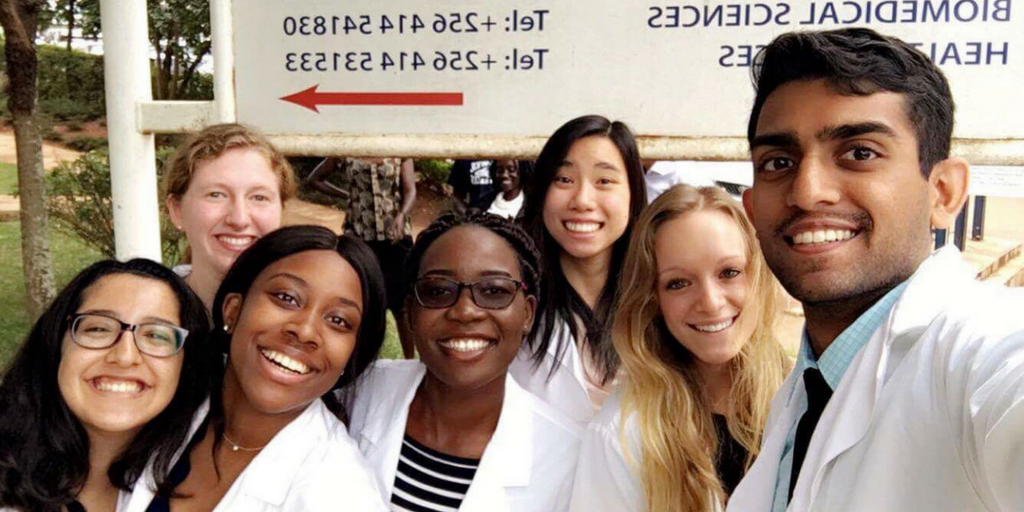Urgent Care: When the Researcher Becomes the Patient
December 19, 2017
By Sam Sadler ’19

This past summer, my Bass Connections team and I traveled to Kampala, Uganda, to continue our research in the neurosurgical ward at the Mulago National Referral Hospital. In partnership with Duke Global Neurosurgery and Neuroscience (DGNN), our team has been working to lower infection rates among neurosurgery patients by developing a long-term protocol for hand hygiene practices in the ward. By assessing the relative usage of wall, bedside and mobile hand sanitizer pumps, we have been working to gather data to improve accessibility and visibility of sanitization materials and routines in order to generate an efficient and sustainable protocol that has the potential to be adopted by similar low-to-middle-income country health care facilities.
This was my first time on site working with the community in Mulago, and despite my formal preparation for the trip, I was genuinely surprised by the conditions. Although I had worked on this project remotely for a year and even seen pictures from the team’s trip to the hospital last summer, I was humbled at my ignorance of the reality on the ground, and realized how limited and disconnected my perspective had been from my seat in a Duke classroom.

Halfway through our project, I fell ill with sepsis, a life-threatening illness stemming from a response to an infection. Instead of rushing to the facility where my team and I had been working, my mentor and I sought urgent care at the International Hospital of Kampala (IHK), one of the best private hospitals in the country. The stark contrast between the IHK and our worksite was shocking in every capacity, from care to cost. The dark reality is – as many doctors in the States have reiterated to me time and time again – the level of care I received at IHK was pivotal in saving my life. The even darker reality lies in how, unlike many in the Mulago community, I had the ability to “purchase” my survival – a source of guilt with which I continue to struggle.
These uncomfortable realities aren’t novel concepts. There exist inherent discrepancies between classroom-based education and reality, and gross discrepancies in health outcomes across different socioeconomic strata. The novelty lies in discovering what specifically stood between my formally-educated self and a more impassioned awareness of such issues in global health: namely, humility and a willingness to be exposed.
This prompted me to reflect: When I set foot in the ward in Uganda, why was I so shocked to find the conditions were exactly what I expected to see? This unsettling realization highlighted a paradox my peers and I often share in our experience of global health education: while I could explain in great detail the provocative facts of global health inequities and the guidelines to proper interventions, I did not grasp what these might mean to individuals and communities on a day-to-day basis. For instance, looking back on my ethics class last fall, which I took in preparation for our trip to Uganda, I found I had been subconsciously reducing essential ethical concepts and stories of struggling (but oftentimes profoundly resilient) communities to abstract concepts or ideas to be memorized.
In the ‘alternate reality’ of a classroom, it’s easy to view the intense topics global health professionals and researchers face through the lens of assignments and grades, and sometimes the disparities that we know ravage the world can seem more like distant simulations than desperate realities. Let me be clear: this “education vs. reality” disconnect is not due to a gap in curriculum. Influential documentaries and first-hand accounts have powerfully portrayed the tangible impact of global health disparities on the everyday lives of many different people. Rather, this disconnect seems to lie in a gap between sympathizing and empathizing, which in part stems from the safe setting of the classroom from which we approach these deeply complex subjects. In this sheltered environment, there is an obvious limit to how much empathy one can truly be taught without becoming offensive or paternalistic by assuming we completely understand and know what’s best for a particular community.

This inherent limit to education represents the point at which theory and the act of receiving knowledge in the classroom must be complemented by practice, or putting knowledge to work in the field. This is where students must choose to seek out the humanity behind their studies. I am beyond grateful for my Duke education, especially within the global health and neuroscience departments. They have helped lay an incredible foundation of knowledge that opens doors to life-changing experiences. However, the responsibility ultimately rests on us – students – to take the opportunity, when possible, to engage in responsible work outside of the bubble that is Duke.
I saw my experience in Uganda expound upon my classroom-based education to instill a more informed, holistic perspective of global disparities. The amazing individuals in our research group inspired me to think critically about my place in the world, and they pushed me to consider my responsibility to pull these lessons from my experiences in Uganda to ensure that I am a better individual, a more informed student and hopefully a wiser doctor.

A large part of this comes from respecting the fact that my experience itself – as dramatic as it may have been for me at the time – is nothing compared to what so many people live through each day. While I cannot claim that I fully know or understand others’ realities, I am working to engage with communities other than my own on an empathetic level rather than from my inherently sheltered standpoint. A doctor is supposed to be a public servant for her patients, but a doctor who does not understand what her patients are going through risks offense through naivety and privilege. Going forward, I will not be complacent in comfort and ignorance and will continuously work to examine myself and the world around me. I will also encourage all students pursuing global health and medicine to seek a similarly open perspective.
Learn More
- Explore the Interventions Improving Neurosurgery Outcomes in Uganda team.
- Check out Sadler’s team’s winning poster from the 2017 Global Health Showcase.
- Save the date for the Bass Connections Fair on January 24. New projects for 2018-19 will be announced on January 10.
Photos: Kampala cityscape (Kelsey Graywill), Sam Sadler in Kampala (Interventions Improving Neurosurgery Outcomes in Uganda team); Neurosurgery ward at the Mulago National Referral Hospital in Kampala, Uganda (Kelsey Graywill); Sadler, second from right, and teammates in Uganda (Interventions Improving Neurosurgery Outcomes in Uganda team); Sadler (second from right) and teammates in Uganda (Interventions Improving Neurosurgery Outcomes in Uganda team)
